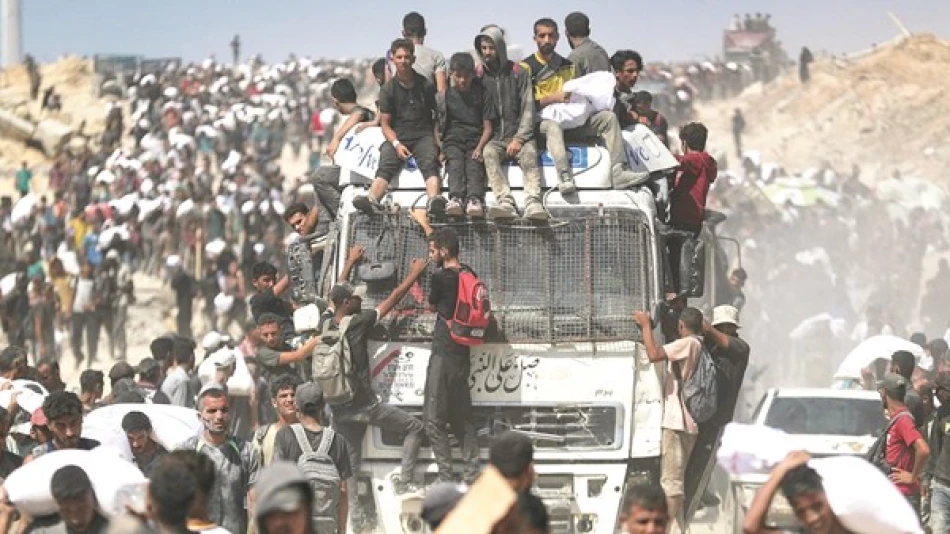
Trump Pledges to Ensure Food Security for Gaza Residents
Trump Mobilizes Gaza Aid Plan as 6,000 UN Trucks Sit Stranded Outside Strip
President Donald Trump has announced his administration is actively developing a humanitarian aid plan for Gaza, describing the territory's conditions as "horrific" while his Middle East envoy conducted a five-hour fact-finding mission inside the devastated enclave. The initiative comes as the UN reports 6,000 aid trucks loaded with food supplies remain blocked outside Gaza, highlighting the complex logistical and political barriers to delivering relief to the territory's starving population.
Trump's Direct Intervention Signals Policy Shift
Speaking to Axios news outlet, Trump emphasized the urgency of the humanitarian crisis, stating "We want to help people. We want to help them live. This should have happened a long time ago." His comments during a White House event were notably direct: "People are suffering from severe hunger, and what is happening is horrific."
This represents a marked departure from typical presidential rhetoric on Gaza, with Trump's team taking concrete steps rather than limiting responses to diplomatic statements. The president's decision to deploy Special Middle East Envoy Steve Witkoff for an on-ground assessment demonstrates a hands-on approach that could reshape U.S. involvement in Gaza's humanitarian landscape.
Witkoff's Gaza Mission Reveals Operational Challenges
Witkoff's visit to Gaza, accompanied by U.S. Ambassador to Israel Mike Huckabee, provided the administration with its first direct assessment of conditions inside the territory. The envoy spent over five hours in Gaza, meeting with officials from the U.S.-Israeli led Gaza Humanitarian Foundation and other relief agencies.
"The goal of the visit is to provide President Trump with a clear understanding of the humanitarian situation and help formulate a plan to deliver food and medical aid to the people of Gaza," Witkoff explained in his first statement following the mission.
Institutional Framework Under Development
The administration has yet to clarify whether aid will flow through the Gaza Humanitarian Foundation—a U.S.-Israeli initiative—or through established international organizations like the United Nations. This decision could significantly impact the speed and scale of aid delivery, as well as its acceptance by various stakeholders in the region.
UN Logistics Bottleneck Exposes Systemic Failures
The revelation that 6,000 UN trucks loaded with food aid remain stranded outside Gaza underscores the massive gap between available resources and delivery mechanisms. Philippe Lazzarini, Commissioner-General of UNRWA (UN Relief and Works Agency for Palestine Refugees), highlighted this crisis on social media, stating the trucks are "waiting for the green light to enter."
This bottleneck represents more than logistical challenges—it reflects the complex approval processes involving Israeli security clearances, coordination with local authorities, and safe passage guarantees that have consistently hampered relief efforts throughout the conflict.
Strategic Implications for Regional Diplomacy
Trump's humanitarian focus comes as ceasefire negotiations with Hamas remain stalled, following Witkoff's meetings with Israeli Prime Minister Benjamin Netanyahu. By positioning humanitarian aid as a separate track from political negotiations, the administration may be attempting to create momentum that could eventually facilitate broader diplomatic breakthroughs.
This approach mirrors successful strategies used in other conflict zones, where humanitarian corridors have sometimes preceded political settlements. However, Gaza's unique circumstances—including Hamas's governance role and Israel's security concerns—present challenges that have historically complicated such efforts.
Market and International Response Likely
The administration's direct involvement could unlock significant private sector and international donor contributions that have been hesitant to engage without clear U.S. leadership. Previous humanitarian initiatives in conflict zones have shown that American presidential attention often catalyzes broader international response, potentially multiplying available resources.
Regional allies, particularly Gulf states that have invested heavily in post-conflict reconstruction elsewhere, may view Trump's initiative as an opportunity to demonstrate humanitarian leadership while building relationships with the new administration. This could transform Gaza aid from a primarily UN-led effort into a broader international coalition with substantially greater resources and political backing.
Most Viewed News

 Layla Al Mansoori
Layla Al Mansoori






